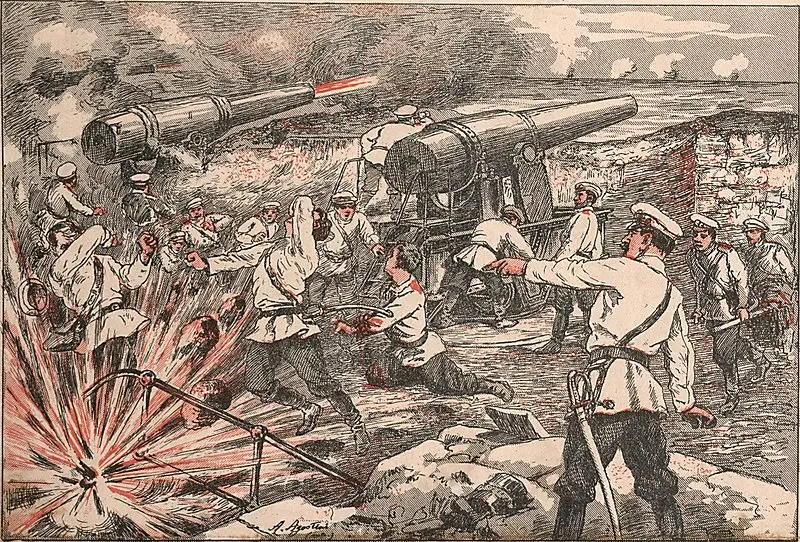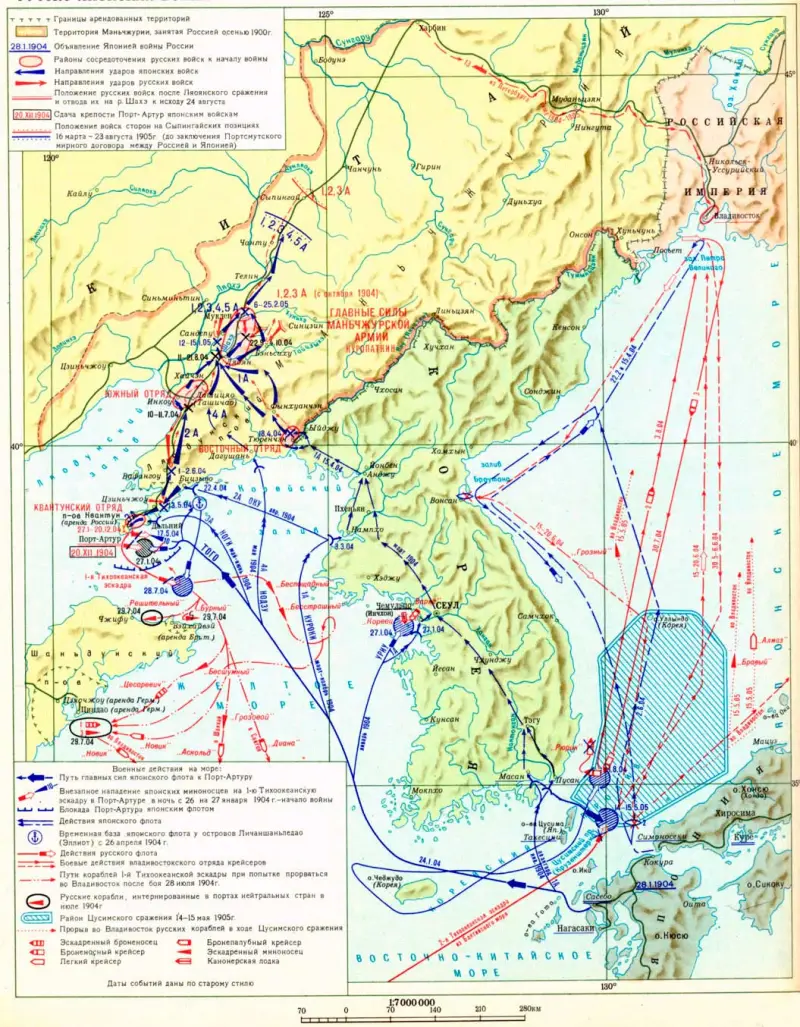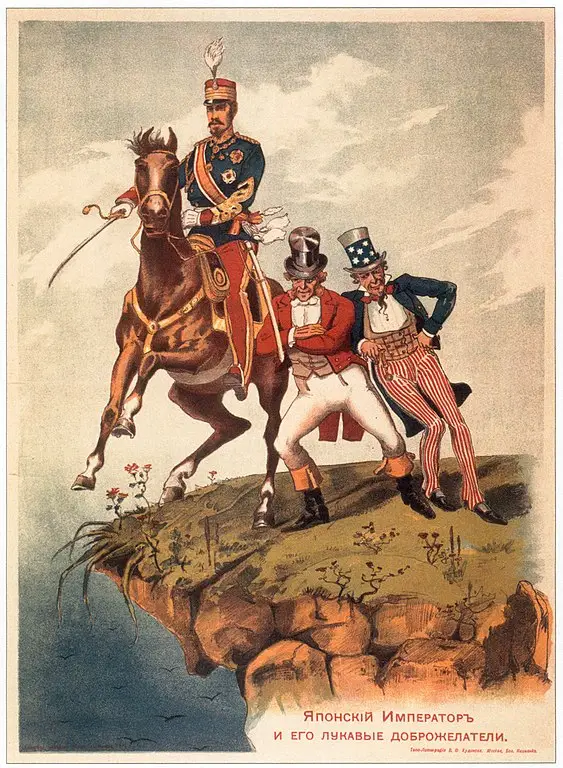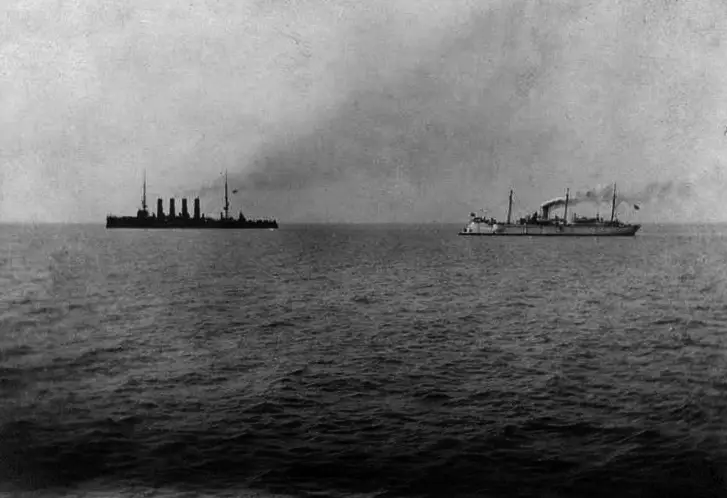Why did Japan attack Russia

The Japanese fleet dealt a decisive blow to the Russian 1st Pacific Squadron in order to solve the problem of supremacy at sea with one blow and be able to freely land an amphibious army and supply it. On the same day, the superior forces of the Japanese fleet attacked the armored cruiser "Varyag" and the gunboat "Koreets" located in the Korean port of Chemulpo. The feat of Russian sailors will live for centuries. “We are dying, but we are not giving up!” - the motto of Russians, faithful to the Fatherland to the end.
The Russian army was not defeated
Thus began a bloody war, full of heroism of Russian sailors and soldiers, who had to clear up the mess of pre-war and military mistakes of the tsarist government and high command.
Despite a number of serious defeats on land and at sea, the Russian armed forces were ready to solve the problem of victory over the Japanese Empire. However, behind-the-scenes intrigues and the weak political will of St. Petersburg led to Russia entering into peace negotiations and giving victory to Japan, which was already on the verge of defeat. Japan was facing financial default. Only loans from the then collective West allowed Japan to wage war.
The Russian army, unfortunately, did not have commanders of the level of Suvorov or Bagration to defeat the enemy in a decisive battle. The Russian generals of this era sank greatly. There were too many “parquet” generals, careerists and blockheads. Initiative, determination, and independence were not in honor.
However, Russian troops carried out Kuropatkin's strategic plan, which actually repeated Kutuzov's maneuver in 1812. By the beginning of political negotiations, the Russian army was at the peak of its capabilities, the Japanese army was exhausted, was bleeding and lost its offensive capabilities. The impending offensive of the Russian army could lead the Japanese to a military-political catastrophe. The population of Japan was significantly smaller than the Russian one, its demographic resource was depleted. Japan has already lost its personnel reserve; it died on the battlefields. Russia just “swinged” and was ready to continue.
The fact that Russian troops on land fought more skillfully than the Japanese is also evidenced by the ratio of losses. In the work of V. Shatsillo, L. Shatsillo “Russian-Japanese War. 1904-1905. Data. Documents” it is reported that the Russians lost 50 thousand people killed, the Japanese - over 86 thousand people. IN Stories military losses of B. Urlanis: Russian losses on land - 177 thousand people (31 thousand killed and died from wounds), Japanese - 232 thousand people (58 thousand killed and died from wounds). According to General Kuropatkin: Japan's total losses in killed, wounded and sick amounted to 554,8 thousand people. In Tokyo alone, more than 60 thousand people were buried in the honorary cemetery.
In a report to the Foreign Minister V.N. Lamsdorf, the Russian envoy to Japan, and then the second representative of Russia during the peace negotiations in Portsmouth, Roman Romanovich Rosen noted:
Japan simply did not have the strength to transfer the war directly to Russian territories, even to the CER zone. The landing on Sakhalin could not decide the outcome of the war.
Thus, Japan won not because of its military and economic superiority, but because St. Petersburg decided to surrender. Russia’s Western “partners” simply convinced the Russian leadership to conclude a peace agreement. “Agents of influence” like Witte also played along with them. Japan was generally able to fight with Russia (taking into account the difference in potentials) only due to the full-scale political-diplomatic, informational, military-material and financial support of the British Empire and the United States, as well as the financial international (world capital) behind them.
The Japanese also took advantage of the fact that Russia had weak military-economic positions in the Far East. Petersburg was preparing for war in Europe. Japan was not perceived as an enemy at all.

The weak are beaten
Two main prerequisites for the Russo-Japanese War of 1904-1905 can be distinguished:
1) this strategic weakness of the Russian Empire in the Far East and many missed opportunities to strengthen its position in the Asia-Pacific region;
2) the purposeful work of the masters of Great Britain and the United States to pit Russia and Japan against each other. The Anglo-Saxons sought to knock Russia out of the Asia-Pacific region with the hands of the Japanese, who were used as a “battering ram.” It was also planned to organize a revolution in Russia and weaken the Russian state.
As everyone knows, the weak are beaten, and fools are taught. The history of the development of the Far East by Russians is full of examples of self-sacrifice, heroism and asceticism of some, and carelessness, greed, stupidity and outright betrayal of Russia's national interests by others. While ascetics and statesmen such as Alexander Baranov, Gennady Nevelskoy and Nikolai Muravyov-Amursky created, discovered, built and strengthened Russian borders, others gave away, sold and simply turned a blind eye to the opportunities that opened up.
Russian researchers and devotees founded it at the end of the 18th - first half of the 19th centuries. huge potential that allowed the Russian Empire to become the dominant force in the Asia-Pacific region, especially in its northern part. Russia owned Kamchatka, Primorye, we received full rights to the Kuril Islands and Sakhalin, the development of the Aleutian Islands, Russian America was underway, Fort Ross in California was our outpost. The Hawaiian Islands persistently asked to be part of the Russian Empire. A Russian outpost was even established on the islands.
In the second half of the 19th – early 20th centuries. there was a real possibility of Korea coming under Russian protectorate, with gradual inclusion into the empire. The Koreans stubbornly refused to submit to the Japanese and looked with hope at the Russians, who were their only hope for a prosperous, independent life. There was a strong “Russian party” in Korea. This opportunity was missed.
The opportunity to establish friendly and even allied relations with Japan was also missed. The Russian fleet was stationed in Nagasaki. In fact, we had a “winter quarters” for our fleet in Japan. In reality, for a very long time there were no particular contradictions between Japan and Russia, and the two powers could become natural allies in the region.
However, thanks to the vague and often simply pro-Western (pro-European) foreign policy of St. Petersburg, when national interests were merged for the sake of the favor of Western “partners,” bureaucratic red tape and the work of “agents of influence” of the West, Russia has lost most of its opportunities in the Asia-Pacific region.
Fort Ross and Russian America were sold. It was a brilliant operation by Russia’s opponents; we lost all positions in America and the possibility of complete control over the northern part of the Pacific Ocean. St. Petersburg was literally “occupied” by a pro-Western group that looked only at Europe and did not care what was happening in the Far East. Nevelskoy and Muravyov accomplished a literal feat when they were able to annex the mouth of the Amur River to Russia. They even wanted to try Nevelsky and demote him to sailor status, but the personal intercession of Emperor Nicholas I saved him.
As a result, for a long time the Far East remained an almost unnecessary outskirts of the Russian Empire. Transport and military infrastructure were not developed. It was only in 1903 that traffic along the Trans-Siberian Railway was opened along its entire length. St. Petersburg did not take advantage of the opportunity to annex the Korean Peninsula and peacefully resolve disputes with Japan.
Russia was drawn into Chinese affairs, including participation in the suppression of the Boxer uprising, the construction of the Chinese Eastern Railway, the lease of Port Arthur, and the clash of Russian-Japanese interests in Korea. This was no longer a gradual expansion of the zone of Russian influence in East Asia, but a chain of strategic mistakes. Russia was deliberately drawn into China and pitted against Japan. A group of businessmen from St. Petersburg, some of them were associated with world capital (the so-called “financial international”), dragged Russia into Korean and Chinese affairs. A huge role in this matter was played by Sergei Witte, the future “Count of Half-Sakhalin” (more details about the destructive role of this figure can be read in S. Kremlev’s work “Russia and Japan: Set off!”).
Bleeding Russia and Japan
England and the USA did everything to pit Russia and Japan against each other. Russia, as noted above, had every chance of becoming the dominant force in the Pacific Ocean, especially its northern part. This did not suit the masters of the British Empire and the United States, who themselves wanted to dominate the Pacific Ocean. In addition, Russia's turn to the East, to Asia, distracted it from European affairs, which also did not suit London and Washington. According to the plans of the Anglo-Saxons, Russia was to play a decisive role in the war with the Teutonic Germans. And then the Russians got distracted from Europe and got bogged down in Far Eastern affairs.
The operation to eliminate Russia from the Pacific Ocean zone was carried out in several stages. First, the “sale of Russian America” operation was carried out. Then they woke up Japan - the mission of the squadron of the American Commodore Perry. The Japanese Empire dozed for a long time in its isolation and had no intention of interfering in the affairs of its neighbors. But Western intervention forced the Japanese elite to follow the path of modernization along the lines of the European powers.
England, and other Western countries, took an active part in the militarization of Japan, the creation of a first-class fleet and army, trained and armed to European standards. The British actually created the Japanese fleet, and the USA and France actively participated in this matter.
The test of strength took place in China, which was then offended and robbed by all and sundry. Sino-Japanese War 1894-1895 ended with the complete victory of the Japanese Empire. China was forced to give up the island of Taiwan, the Penghu Islands and the Liaodong Peninsula forever, and pay a large indemnity, which was used for further militarization.
Russia, Germany and France intervened and took away part of their loot from Japan. Japan was forced to withdraw its troops from the Liaodong Peninsula. Russia concluded an allied treaty with China, acquiring the right to build a railway through the territory of Manchuria. In 1898, Russia received the ports of Port Arthur and Dalny (Dalian) with adjacent territories and water space. Russia also received the right to lay railways to these ports from the CER (South Manchurian Railway). Thus, Russia took Japan’s Liaodong Peninsula captured during the war with China, which led to a new wave of militarization and anti-Russian military psychosis.

Russian poster of the Russo-Japanese War. The Japanese Emperor and his crafty well-wishers (Typo-Lithography by V.V. Kudinov, Moscow, Bolshaya Yakimanka). John Bull (England) and Uncle Sam (USA) push the mounted Japanese Mikado into the abyss. 1904
Attempts to come to an agreement
Japan nevertheless tried to come to an agreement and conclude an agreement with Russia on the division of spheres of influence in Korea and Manchuria. Ito Hirobumi proposed leaving Manchuria for Russia, and Korea was to become Japan's sphere of influence. However, Ito’s initiative did not find understanding in St. Petersburg.
Therefore, the Japanese government decided to enter into an alliance with the British Empire. On January 17 (January 30), 1902, the Anglo-Japanese Treaty was signed, which deprived Russia of the support of any European power. Japan received a reliable rear. Subsequently, Japan received full financial support from England and the United States, without which it would not have been able to fight at all. The pumping up of the military, especially the naval muscles of the Japanese Empire, also continued.
At the end of July 1903, Japan again invited Russia to discuss the Far Eastern issue. Apparently, Japan was still trying to resolve the matter peacefully. The Japanese knew that the potentials of Russia and Japan were very different, in favor of the Russians. Russia could transfer almost the entire composition of the battle fleet from the west of the empire to the east. Relations with Germany were good then. The Russian army was much stronger.
During the Russo-Japanese War, Germany generally acted and behaved as practically the only ally of Russia. Berlin was the only one that benefited from Russia's reorientation to the Pacific Ocean. The enormity of the Russian army simply frightened the Japanese: the Russian army in peacetime - more than 1 million people, the Japanese army - 180 thousand people. These fears were all the more justified because there was still no confidence in their own army. Japanese soldiers were trained by French and German instructors, but the new Japanese army had not yet dealt with a strong enemy. The only asset the Japanese had was a victory over a completely degraded China. It was scary to fight with Russia. The opportunity to reach an agreement still existed, despite all the prodding from Britain and the United States.
In August 1903, the Japanese submitted a draft agreement to the Russian Foreign Ministry. Both sides had to recognize the independence and territorial integrity of Korea and China and support the principle of equality in the commercial and industrial sphere. Russia had to recognize the predominance of Japanese interests in Korea, the Japanese recognized Russia's special railway construction interests in Manchuria. Japan received the right to continue the railway lines built in Korea to Southern Manchuria, until they connected with the CER and a branch of the southern part of the CER to Beijing.
Thus, the Japanese did not demand the abandonment of Port Arthur, but blocked Russia’s economic activity in Korea and limited it in Manchuria. The Japanese gained wide access to Northeast China. Moreover, this was only a project; negotiations could be continued.
Overall, this project was worthy of attention. Port Arthur and the Far East remained with Russia; the Japanese did not lay claim to the Chinese Eastern Railway and its branches. The further expansion of Russia, taking into account all the missed opportunities of the whole century, did not make much sense. We have already received everything we needed. The most important thing Russia had was a naval base in the southern seas and a railway to it.
However, St. Petersburg is escalating. On October 5, Japan was sent a response project, which provided for Russia's recognition of the predominant interests of the Japanese in Korea, in exchange for Japan's recognition of Manchuria as lying outside its sphere of interests. The provision on the exclusion of Manchuria from the zone of its interests did not categorically bother Japan. In December 1903, Japan issued an ultimatum note to Russia, demanding full recognition of its rights in Korea.
"Japan is leading our game"
At the same time, Japan receives an encouraging signal from the United States. On the same day, October 8, 1903, the United States and Japan enter into trade agreements with China. Both England and the United States unanimously “advise” (instruct) China not to be friends with Russia. The US then officially assures Japan that in the event of war, American policy will be favorable to the "Shinto Empire".
Already during the war, American President Theodore Roosevelt would say:
Quite clearly the anti-Russian game was noticed in Berlin. On January 9, 1904, Kaiser Wilhelm wrote to Emperor Nicholas:
True, here we need to correct the German emperor. More precisely, “they decided” - England and the USA.
At the beginning of 1904, at the special invitation of the Japanese emperor, the American war minister Taft arrived in Japan, who conveyed Roosevelt’s promise to give Japan military support if France and Germany took the side of Russia. And Japan decided to go to war.
On February 5, 1904, the Japanese Foreign Ministry instructed the ambassador in St. Petersburg by telegraph to stop negotiations and interrupt diplomatic relations with the Russian Empire. On February 6, Japan officially announced the severance of diplomatic relations with Russia. The Russian response to the December ultimatum left on February 3, but was detained in Nagasaki and delivered to Rosen only on February 7.
Back on January 22 (February 4), 1904, a joint meeting of members of the Privy Council and the Cabinet of Ministers was held in Japan, at which a decision was made to start a war against Russia. On the night of January 23 (February 5), an order was given to land an airborne army in Korea and attack the Russian squadron in Port Arthur. January 24 (February 6) the Japanese fleet leaves for combat positions. Formally, Japan declared war on Russia on January 28 (February 10).
On the night of January 27 (February 9), 1904, before the official declaration of war, 8 Japanese destroyers conducted a torpedo attack on the ships of the Russian fleet stationed on the outer roadstead of Port Arthur. As a result of the attack, two of the best Russian battleships (Tsesarevich and Retvizan) and the armored cruiser Pallada were disabled for several months.
On January 27 (February 9), 1904, a Japanese squadron consisting of 6 cruisers and 8 destroyers forced the armored cruiser "Varyag" and the gunboat "Koreets" located in the Korean port of Chemulpo into battle. After a 50-minute battle, the Varyag, which received heavy damage, was scuttled, and the Koreets was blown up.
Formally, Japan declared war on Russia on January 28 (February 10), 1904.

“Varyag” and “Korean” go to battle. January 27 (February 9), 1904
Information